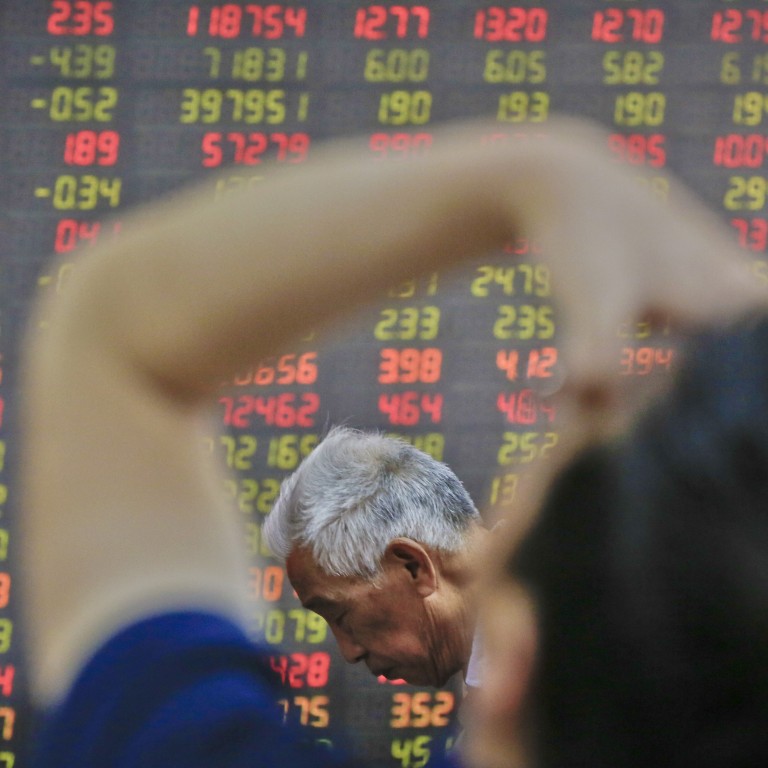
Chinese equity investors, unsure of a sustainable bull run, place wagers on defensive plays
- An index of consumer stocks has surged 60 per cent this year as the best-performing sector on the Shanghai Composite Index
- The resilience of consumer stocks has called into question the sustainability of the gains in the benchmark so far
There is a paradox in China’s world-beating stock rally this year: defensive plays are turning out to be the best performers.
While Chinese stocks have technically been in bull market territory this year following a 20 per cent gain in the Shanghai Composite Index, safe bets have been leading the charge so far. A gauge of consumer staples companies, from liquor distillers to dairy and food seasoning makers, has climbed 60 per cent, outperforming all other sectors.
The resilience of consumer stocks has baffled investors. Some say the scenario adds to evidence that there has never been a bull market, while others argue the quick gain in stock prices and ballooning turnovers are convincing signs of a raging bull.
The stock market sentiment has looked shaky recently, with the Shanghai Composite down almost 10 per cent from an April high. Overall corporate earnings have failed to catch up with share-price gains; economic growth is showing signs of decelerating again and a trade war against the US has flared up once again.
“It’s not a full-fledged bull market, as there are only a handful of stocks holding on to sizeable gains,” said Wang Chen, a partner at Xufunds Investment Management in Shanghai. “For a full-fledged one, you will need to have loose liquidity and economic prosperity. But the latest data seems to corroborate the argument that growth hasn’t bottomed out. So smart money has no choice but to chase those companies with stable earnings growth and cash flows.”
The Shanghai Composite had climbed as much as 31 per cent through April after a detente in the trade spat and a stabilisation in the economy spurred a buying binge. The rally has quickly run out of steam as the economic data deteriorated again and the trade spat re-escalated. Some of the hottest and speculative trades, such as plays linked to China’s new technology board and the outbreak of the African swine flu, began to unravel, giving up most of the gains.
In contrast, consumer stocks have been immune to the souring sentiment, trading close to their record highs. Earnings growth may explain the discrepancy in share prices. Major players in the sector, including Kweichow Moutai and Wuliangye Yibin, posted at least 30 per cent increases in first-quarter profits, compared with an average 13 per cent growth for all mainland-listed companies.
The recent slew of worse-than-estimated economic data may reinforce the bets on consumer stocks. Reports released this week by the statistics bureau showed industrial output, retail sales and fixed-asset investment all fell short of analysts’ projections in April. That further dampened the growth outlook of the world’s second-largest economy, which was worsened further by the administration of US President Donald Trump more than doubling tariffs on US$200 billion worth of Chinese imports last Friday.
“I wouldn’t say it’s a bull market,” said Ken Chen Hao, a strategist at KGI Securities in Shanghai. “The downtrend in economic growth hasn’t changed its course, so there isn’t a big chance that we’ll see a bull market. That’s why those companies with stable profit growth have become havens.”
Consumer stocks have beaten the Shanghai Composite every year since 2015 when a meltdown wiped off US$5 trillion in market cap. Foreign buying has been adding fuel to the rally in consumer stocks this year, as they ratcheted up investment in Chinese stocks, whose weighting in MSCI’s global gauges are set to rise fourfold by November.
The Shanghai Composite added 0.6 per cent to 2,955.71 at the close on Thursday, though almost 40 per cent of the gain made this year has been erased.
“It’s not yet a bull market as it’s not yet shown sustainable gains,” said Hong Hao, managing director of Bocom International Holdings in Hong Kong. “The consumer sector has stable earnings growth. But its strength also means people have run out of ideas.”

